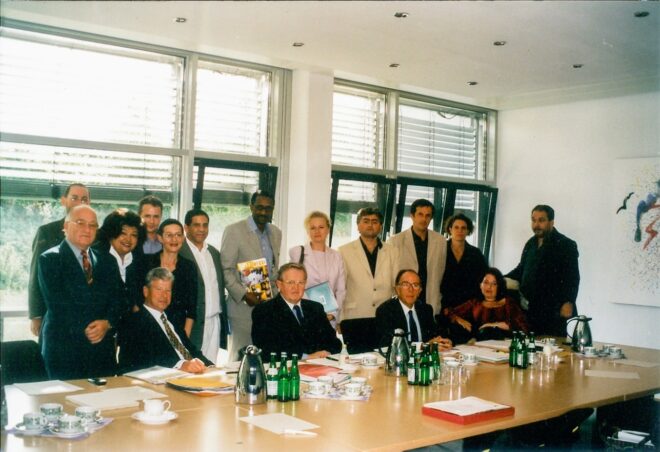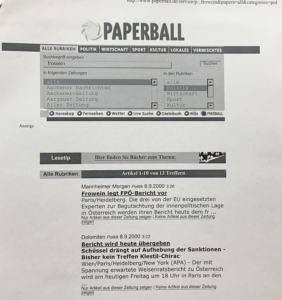In the summer of 2000, the Max Planck Institute for Comparative Public Law and International Law (MPIL) was at the centre of European legal debates and Austrian media attention: The institute’s director Jochen Abr. Frowein had been nominated alongside Martti Ahtisaari and Marcelino Oreja as one of the so-called three Wise Men to evaluate the fourteen EU member states “measures against the Austrian government”. The question at the heart of this European affair – how should the union monitor and sanction a member state in violation of shared European values? – was posed at a critical moment in the EU history and concerns us until today.
Introduction
In late August 2000, journalists outnumbered researchers and students at 535 Neuenheimer Feld in Heidelberg. On this cool summer day, director Jochen Abr. Frowein was not amused about the media frenzy at the MPIL as he made his way through a jungle of cameras for a meeting with former Finnish president Martti Ahtisaari and former European Commissioner Marcelino Oreja.[1] These three “Wise Men” had been nominated earlier in the summer by Luzius Wildhaber, the president of the European Court of Human Rights to investigate “the Austrian Government’s obligations to the European values, in particular in regard to the rights of minorities, refugees and immigrants,” and “the development of the political nature of the FPÖ.”[2]
This mission was the final chapter in the struggle over the so-called “EU sanctions against Austria” between the Vienna government and the fourteen member states of the EU (EU‑14). These diplomatic and bilateral measures had been imposed after the far‑right Freiheitliche Partei Österreichs (Freedom Party of Austria, FPÖ) had entered a government coalition with the conservative Österreichische Volkspartei (Austrian People’s Party, ÖVP) in February 2000. The sanctions reduced diplomatic relations to a technical level and at EU summits, ministers refused to shake hands or pose for photos with their Austrian counterparts. Some statements related to the sanctions bordered on the bizarre: For example, Belgian Foreign Minister Louis Michel called on Belgians to cancel their winter vacation Austrian as he considered skiing in Austria “immoral” in the current situation (he later apologized for this statement).[3] Thus, the measures were neither actual political or economic sanctions nor had they been imposed by the European Union. As symbolic gestures, they expressed the concerns of the EU‑14 over a far‑right party joining a national government as a result of the surge of xenophobia, racism, and right-wing populism across Europe after the end of the Cold War. The Austrian government rejected the “sanctions”, arguing that they represented a violation of the “fundamental legal principles and the spirit of the European treaties”.[4]
The “sanctions” coincided with a critical moment in the history of European integration: Since the late 1980s, the EU had assumed a role as protector and promoter of human rights, democracy, and the rule of law. These common European values played a crucial role in transforming the union from an economic into a political one. Simultaneously, institutional reform was underway to enable the accession of new member states from Central and Eastern Europe. At this watershed and for the first time in EU history, the “sanctions” called into question the formation of a national government by citing potential violations of common European values. This conflict between the EU‑14 and the Austrian government has become ingrained in institutional memory as it accelerated the introduction of a specific mechanism for sanctioning. At the same time, this historical episode continues to paralyze the EU when it comes to handling violations of its fundamental values in a member state.[5] As such, the “sanctions” have served as a cautionary tale for the EU for two reasons: First, they created an opportunity for the controversial Austrian government to increase its popularity by claiming that foreign powers were trying to undermine the outcome of a democratic election. While only 53,82 percent of the electorate had voted for ÖVP and FPÖ in the previous election, polls showed that a vast majority of voters opposed the “sanctions” – which were perceived as an unjust stigmatization of the country’s population as “Nazis” – and supported the resistance of the new government.[6] Second, the “sanctions” were imposed without any conditions for their abolition and it had thus to be assumed that only the collapse of the government would end them.[7] After months of deadlock, the Austrian government threatened to block further institutional reform in the EU, legitimized by a popular referendum (Volksbefragung) in Austria on “the further development of EU law”.[8] Simultaneously, the European Commission and the European Parliament had urged the EU‑14 to re‑evaluate the measures and find a solution acceptable to all sides.[9]
Finally, the Portuguese Council Presidency asked the president of the European Court on Human Rights, Luzius Wildhaber, to appoint “three personalities” to deliver a report on the Austrian government’s “commitment to the European values” and the “political nature of the FPÖ” at the end of June.[10] The social democrat Ahtisaari and the conservative Oreja were appointed due to their long careers in politics and diplomacy, in particular concerning international law and human rights. Meanwhile, Frowein was chosen based on his excellent reputation for his work at the intersection of theory and practice of international law and human rights, especially through his long‑standing membership of the European Commission for Human Rights from 1973 to 1993.[11] During his academic career, Frowein made significant contributions to the study of the prohibition of the use of force under international law, the right to self‑defense, and the protection of human rights at the local and universal level, e.g. on the freedoms of expression, assembly, and religion, as well as the prohibition of discrimination and asylum law.[12]
The Wise Men in Vienna
Following a preliminary meeting in Helsinki on 20 July, Frowein, Ahtisaari, and Oreja re-convened in Vienna for their “almost impossible mission” of putting “an entire country under scrutiny.[13] Frowein was the first to arrive in Vienna on a rainy 27 July. A small crowd of journalists and protesters welcomed the MPIL director on Vienna’s Ringstraße in front of the noble Hotel Imperial.[14] The next day, the Wise Men began their “intensive program” of meetings with Austrian officials to discuss the commitment of the Austrian government to common European values.[15] No minor detail about the delicate mission – e.g. the traditional Austrian dishes served at the lunch with chancellor Schüssel (Rindssuppe, Tafelspitz, Topfennockerl) – went unnoticed by the Austrian media, as Frowein, Ahtisaari, and Oreja gave journalists very little to report as they “appeared unnoticed” on the scene, “remained eloquently silent” in front of the journalists” and “disappeared again quickly”.[16] While the media soon grew frustrated with the trio, the interlocutors were “extremely impressed” by their “meticulous preparation”.[17]

The MPIL’s very own “Jörgi-Bär” [19]
While the Wise Men met with the FPÖ leadership at the time to assess the “political nature” of their party, they did not meet with the man often considered solely responsible for the party’s success: Jörg Haider was a controversial and charismatic figure in Austrian politics whose recipe for success consisted of combining far-right poliicy with populist rhetoric. However, by the summer of 2000, Haider was, according to his own description, only a “simple party member” as he had stepped down as party leader to appease domestic and international criticism of the ÖVP-FPÖ coalition. Nevertheless, the FPÖ made sure that the Wise Men received a symbolic effigy of their figurehead: A so-called “Jörgi-Bär”, a small stuffed teddy bear the FPÖ had handed out as a giveaway in the previous election campaign, was sent to Heidelberg by the party as part of an information package. Until today, this small teddy bear can be found in the MPIL’s archive. The Austrian daily Der Standard cynically remarked that this was nothing but a “cuddle attack” on the Wise Men by the FPÖ to trivialize their extreme agenda.[18]
The Wise Men in Heidelberg and the Final Report
One month later, the trio reconvened at the seat of Frowein’s Institute to hold additional meetings and to finalize their report. More than twenty representatives of Austrian civil society flocked to the MPIL in Heidelberg. Opposition parties and NGOs criticized that the trio had only met with government officials during their visit to Vienna. The human rights organization SOS Mitmensch had asked for a meeting with Frowein specifically as they considered him to be “especially sensitive” to their concerns about the recent surge of racism and xenophobia in Austria.[20] Frowein, Ahtisaari, and Oreja “pricked up their ears” as the civil society representatives reported on the radicalization of the political climate since the FPÖ had joined the coalition.[21] After their final meeting with vice‑chancellor and FPÖ leader Susanne Riess‑Passer, the trio had “enough material to fill a library”. [22] Martti Ahtisaari mused that he would not mind if finishing the report would take a little longer and his stay at the MPIL would be extended as he had not been to Heidelberg since 1985.[23]
On 8 September 2000, Frowein, Ahtisaari, and Oreja traveled to Paris to meet with President Jacques Chirac who was heading the French Council Presidency. Unlike their biblical eponyms, these Wise Men did not bring gold, frankincense, and myrrh but their Report on the Austrian Government’s Commitment to the Common European Values, in Particular concerning the Rights of Minorities, Refugees and Immigrants, and the Evolution of the Political Nature of the FPÖ[24]. The ceremonial handover in the Élysée Palace was disturbed by a “diplomatic scandal” characteristic of the early internet age: The Spanish daily El País leaked the report before Chirac received it.[25] After Chirac had received the report, it was made available to the general public on the MPIL’s website, which had been introduced in 1996 (for more on the digital transformation at the institute see the contribution by Annika Knauer on this blog).[26]
The report found that the new Austrian government was committed to common European values. Its “respect in particular for the rights of minorities, refugees and immigrants is not inferior” and could even be considered higher than in other EU member states.[27] Furthermore, the report assessed that the Austrian government had taken steps to combat historical revisionism, discrimination, and prejudice. Regarding the “political nature of the FPÖ”, the trio voiced stronger concerns as they characterized it as a “right‑wing populist party with radical elements”, pointing out that the party “enforced xenophobic sentiments in campaigns”.[28] In addition, the report condemned the FPÖ’s practice of “suppress[ing] criticism by the continuous use of libel procedures” against journalists and researchers.[29] While the report stated that the measures “heightened awareness of the importance of the common European values” and “energized civil society” to defend them, Frowein, Ahtisaari, and Oreja also stressed that they “have in some cases been wrongly understood as sanctions directed against Austrian citizens” and were therefore simultaneously “counterproductive”.[30] A few days later, the EU‑14 followed the recommendations of the Wise Men and lifted the measures against the Austrian government.[31] Finally, Frowein, Ahtisaari, and Oreja urged the EU to develop a mechanism for evaluating member states’ commitment to common European values. They recommended the “introduction of preventive and monitoring procedures into Article 7 of the EU Treaty [EUT] so that a situation similar to the current situation in Austria would be dealt with within the EU from the very start.”[32]
Conclusion
Less than a year later, at the Summit in Nice in February 2001, the EU introduced a mechanism for sanctioning member states’ violations of European values, with the suspension of voting rights of the accused member state as a last resort. In a crucial moment of EU history and as European values were put to the test, MPIL director Jochen Abr. Frowein alongside Maarti Ahtisaari and Marcelino Oreja was sent to Vienna on a delicate mission. The contributed to reforming how the EU protects and promotes its common values – at least on paper.
The question of how the EU should promote its common values and sanction those who violate them concerns the union to this day and perhaps now more than ever. The lesson of the measures taken by the EU‑14 against the Austrian government is twofold: On the one hand, they accelerated the introduction of a clear procedure in the TEU. On the other hand, the EU has been notoriously cautious to trigger this mechanism against members such as Hungary and Poland. Beyond the internal workings of the union, increasingly the question arises how the EU wants to promote its values beyond its member states and how far it is willing to go, as the debates about military assistance for Ukraine and the introduction of the EU Supply Chain Directive have shown. There is still plenty to discuss in Europe and at the MPIL about common European values, their promotion, and enforcement. It remains an “almost impossible mission.”
[1] Eva Linsinger, ‘Da haben sie die Ohren gespitzt‘: Menschenrechtsgruppen und Riess-Passer bei den drei Weisen in Heidelberg,“ Der Standard, 31 August 2000.
[2] Waldemar Hummer, The End of EU Sanctions against Austria – A Precedent for New Sanctions Procedures?, The European Legal Forum 2 (2000), 77-83, 79.
[3] Belgiens Außenminister Michel nennt eigene Äußerungen ’dumm‘, Tagesspiegel, 27 February 2000.
[4] Bundesministerium für auswärtige Angelegenheiten, Außenpolitischer Bericht 2000: Jahrbuch der Österreichischen Außenpolitik, Wien: Bundesministerium für auswärtige Angelegenheiten 2000, 30.
[5] Kim Lane Scheppele/Laurent Pech, Didn’t the EU Learn That These Rule-of-Law Interventions Don’t Work?, Verfassungsblog, 9 March 2018.
[6] Andreas Middel, Wien zeigt sich gegenüber der EU stur, Die Welt, 3 June 2000.
[7] Frank Schorkopf, Die Maßnahmen der XIV EU-Mitgliedstaaten gegen Österreich: Möglichkeiten und Grenzen einer “streitbaren Demokratie” auf europäischer Ebene, Berlin: Springer 2002, 145.
[8] Bericht des Hauptausschusses über den Antrag 211/A, Nr. 268 der Beilagen zu den Stenographischen Protokollen des Nationalrates, XXI. GP, Wien: Österreichisches Parlament, 11 July 2000.
[9] Hummer (fn. 2), 78.
[10] Schorkopf (fn. 7), 161.
[11] Porträts, Die Presse, 9 September 2000.
[12] Rüdiger Wolfrum, Jochen Abr. Frowein Zum 70. Geburtstag, Archiv des Öffentlichen Rechts 129 (2004), 330–332.
[13] Eine fast unmögliche Mission, Der Standard, 28 July 2000.
[14] Susanna Heubusch, Privatbutler und Topfennockerl – erlesener Service für den ‚Weisenrat‘, Kurier, 30 July 2000.
[15] Karl Ettinger/Friederike Leibl, Drei Weise, zehn Sessel 100 Journalisten, Die Presse, 29/30 July 2000; for a complete list of the meetings held in Vienna, see: Schorkopf (fn. 7), 195–97.
[16] Ettinger/Leibl (fn. 16).
[17] Heubusch (fn. 15); Drei Weise prüfen Österreich: ‘Sie meinen es sehr ernst‘, Die Presse, 29/30 July 2000.
[18] Eva Linsinger, FPÖ-Kuscheloffensive, Der Standard, 25 July 2000.
[19] Photo: MPIL.
[20] Fakten statt Diffamierung, News, 33/2000.
[21] Linsinger, Ohren (fn.1).
[22] Eva Linsinger, Das Ende einer Dienstfahrt, Der Standard, 31 August 2000.
[23] Linsinger, Ende (fn. 23).
[24] Martti Ahtisaari/Abraham Frowein/Marcelino Oreja, Report on the Austrian Government’s Commitment to the Common European Values, in Particular Concerning the Rights of Minorities, Refugees and Immigrants, and the Evolution of the Political Nature of the FPÖ (the Wise Men Report), International Legal Materials 40 (2001), 102–123.
[25] Nikolaus Nowak, Diplomatischer Skandal: ‚El Pais‘ bekam Bericht zu Österreich vor Chirac, Die Presse, 9 September 2000.
[26] Under Frowein’s leadership, the MPIL had become a trailblazer for digitization in the MPG, see: Rudolf Bernhardt/Karin Oellers-Frahm, Das Max-Planck-Institut für ausländisches öffentliches Recht und Völkerrecht, Contributions on Comparative Public Law and International Law, Vol. 270, Heidelberg: Springer 2018, 23.
[27] Ahtisaari/Frowein/Oreja (fn. 25), 119.
[28] Ahtisaari/Frowein/Oreja (fn. 25), 120.
[29] Ahtisaari/Frowein/Oreja (fn. 25), 120.
[30] Ahtisaari/Frowein/Oreja (fn. 25), 121.
[31] Schorkopf (fn. 7), 201-202.
[32] Ahtisaari/Frowein/Oreja (fn. 25), 120.

Constanze Jeitler ist wissenschaftliche Mitarbeiterin am Lehrstuhl für Neueste Geschichte und Zeitgeschichte an der LMU München. In ihrer Dissertation befasst sie sich mit der Geschichte der Freiheitlichen Partei Österreichs als alternative Erinnerungsgemeinschaft nach 1945.


